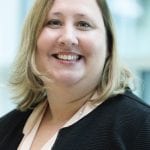Biography
Dr. Amy Donley is an Associate Professor in the Sociology department and Director of the Institute for Social and Behavioral Science (ISBS). Her research interests include social inequalities, specifically poverty, food insecurity, and housing precarity and homelessness, as well as various issues related to social policy, public health, and crime.
She is currently leading several research projects in ISBS including a multi-method study of overdoses in hotels and motels in Centra Florida, an evaluation of programs designed to increase food security in partnership with United Against Poverty, and an impact evaluation of an Orange County program funded by the Department of Justice assisting individuals with opioid use disorder who have been incarcerated in the Orange County jail, among others. In addition to the work in ISBS, Dr. Donley has her own active research agenda. Current projects include: an analysis of interventions undertaken in food deserts across the US and Canda, an examination of the “twindemic” of poverty and intimate partner violence, and a multi-method study of the intersection of Good Samaritan 911 laws and Drug Induced Homicide laws.
She has published in several journals, including Journal of Social Distress and the Homeless, Journal of Applied Social Sciences, and Journal of Forensic Psychology Practice. Her most recent book, co-authored with Julio Montanez and Dr. Amy Reckdenwald is entitled, Between Systems and Violence: State-Level Policy Targeting Intimate Partner Violence in Immigrant and Refugee Lives.
Dr. Donley works closely with both undergraduate and graduate students. In ISBS, she operates an Undergraduate Research Assistant program which allows up to 20 students from across campus to work on ISBS projects every semester. She is also currently chairing or serving on 8 Honors Undergraduate Thesis Committees and several MA thesis and PhD dissertation committees. Every semester she works with graduate students conducting research. Students interested in conducted applied sociological work are encouraged to contact Dr. Donley to discuss current opportunities.
Research Interests
- Applied Sociology
- Poverty and Homelessness
- Urban Sociology
- Substance Use
- Public Policy
Office Hours
Thursdays, 3:00-6:00PM



